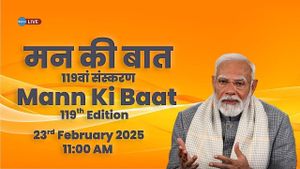During the recent Alpha-Bank Cup of the strongest athletes held at Raubichi, biathlete Anton Babikov shared his thoughts on several pressing issues facing the sport. Known as one of the significant figures in Russian biathlon over the last decade, Babikov has gained notoriety not only for his performances but also for his candid commentary on the sport's internal dynamics.
Having earned medals at multiple European Championships, participated in the 2018 Olympics, and held onto cherished memories from his activities on the international biathlon stage, Babikov's insights resonate with both fans and athletes alike. After his team secured second place during the mixed relay at the recent event, he took some time to engage with supporters and reflected on different aspects of biathlon.
Babikov, who is noted for his forthrightness, suggested meaningful changes for the sport. He emphasized the need for races to begin with mixed relays or single-mixed events rather than sprints, expressing his belief, "Such extended competitions should not kick off with sprints but with mixed relays or single-mixes. Athletes require some momentum before the sprint, as is typical at world championships and other major international starts. This is why my performances at the initial events of the Cup of the Commonwealth are often subpar. I tend to find my rhythm as the tournament progresses." This assessment hints at areas of improvement within competition structuring, ensuring athletes are energized before facing strenuous races.
Babikov has opted for self-preparation instead of traditional team training, which he describes as having proven beneficial. He said, "Just look at our performance statistics. It was undoubtedly the right decision. The efficiency of our team—‘The Union of Three Biathletes’—is many times higher than the national team." His comments suggest he and his colleagues such as Alexander Loginov and Dmitry Povaritsyn find the autonomy of self-coached training more fulfilling and efficient, reducing unnecessary expenses and personnel. Babikov expressed sympathy toward those still training under the national team, acknowledging their efforts but questioning the effectiveness of such arrangements.
When discussing the competition structure, Babikov addressed the recent exclusion of Daniel Serokhvostov from the mass start. He clearly stated his stance against the restrictions within the regulations, asserting, "No, I’m against this extra quota for him. This situation is the result of existing problems. Instead of just addressing the symptoms, it’s time to tackle the root issues." Expanding on this, he commented on the flaws within the competition regulations saying, "The problem is, nobody reads the competition regulations; people don’t care what nonsense is there. Then we start pretending the athletes are to blame for resisting changes like allowing Serokhvostov to compete. Nobody is against him!"
Babikov proposed modifications to the eligibility requirements for mass starts, advocating for larger participant pools, saying, "Let’s conduct mass starts with 60 participants! Everybody wants to compete." This highlights his desire for inclusivity within the competition framework, allowing more athletes the chance to showcase their skills.
He also shared valuable insights on the preparation strategies for athletes, quipping about his favorite form of training, saying, "Only if it were to the sea!" He playfully noted the logistical challenges of training costs and sponsorships, underscoring how discussions about international training trips often involve different motivations among athletes, particularly for those aspiring to qualify for the next Winter Olympics.
His commentary reflects the collective ambition and camaraderie within the biathlon community. Looking forward, Babikov conveyed both pride and frustration about the current direction of Russian biathlon, reiterations of both hope and disappointment threading through his messages as seasons change. It seems Babikov is significant not just as another athlete but as part of the broader conversation needed to refine the sport’s regulations and structures.
With renewed discourse on what it means to train and compete, Babikov drew attention to the necessity for honest discussions about biathlon’s future. His insights generated excitement and anticipation among fans and athletes alike as they await the next opportunity to witness this dynamic sport continue to evolve.
Viewers can catch the final events of the Alpha-Bank Cup live on Match TV, as Babikov and his teammates aim for continued success amid the many challenges they face.



